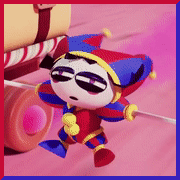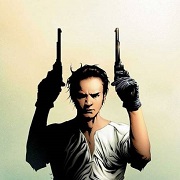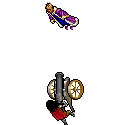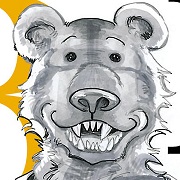|
ChickenWing posted:There must be some literary definition of legend I'm not familiar with. He doesn't need to represent anything to be a legend as far as I know. The series is about Kvothe's legend. We both agree. Kvothe and his legend don't represent anything. Again we agree. Therefore, the series doesn't represent anything - in other words, it's about nothing.
|
|
|
|

|
| # ? May 24, 2024 22:20 |
|
ChickenWing posted:Okay I'm using the wrong word for it then. I just know that most trilogies work like this: He also said pretty plainly that everything he's heard of himself in legends is, at best, half-truths. But so far that hasn't been the case. He's been super great at basically every endeavor he's undertaken. The only setbacks he's ever experience are monetary ones. He's a great magician, he's a great lutist, a lady killer, a silver-tongued linguist, an incidental namer, and a naturally gifted sex haver. He gets paid to attend University for his first semester. He performed malicious magic on a teacher, and wasn't expelled. He saved a woman from a burning building while also identifying the source of the fire. He scared off hired thugs by accidentally performing a highly-secret and difficult magic. He attempted to kill his primary moneylender by basically boiling her blood, and was back on friendly terms within a few chapters. He killed a dragon within, like, a year of first formally learning sympathy. He learned a secret ninja art like it was nothing. He was accepted into that secret ninja society almost as easily. The worst thing that happens to him after leaving Tarbean is basically when his lute breaks, but even that was solved pretty easy-peasy if I remember right. Maybe something worse happens in Wise Man's Fear, but I pretty genuinely don't remember much of that book outside of what I've already listed. I think he becomes somebody's ward, basically, and has another class struggle or something? And all of that drama revolves around money again, I think. He's constantly broke, and inept at interpersonal relations, and those are basically his only flaws. The only times he loses are times when there is money on the line. He almost gets expelled and would have to pay back the negative tuition he got, he breaks a lute string and can't afford to get it re-strung, he loses a chance at a sponsor, he gets his tuition upped and has to go to a loan shark, etc... I know it's not interesting to have your hero not kill a dragon, or to not be taught an ancient martial art, but putting a few stumbling blocks in his way that aren't that he can't afford a boat trip or has to buy a new horse something. Again, this is just me, and this feeling doesn't really kick in for me until WMF, so whatever. But as much as I like the book, I absolutely get where people are coming from.
|
|
|
BravestOfTheLamps posted:The series is about Kvothe's legend. We both agree. First off, there's a good bit of yet implicit in all this. If Doors of Stone comes out and it's pointless and vague and doesn't tie anything up then I'm going to lose a lot of my footing, but I feel like a lot of threads are going to be twisted together into a nice plotty knot. Second, I feel like your last sentence there doesn't really logically follow. Saying something "doesn't represent anything" means that it is what it is, it's not trying to present another message other than the immediately obvious one. Saying something "isn't about anything" means that there's no subject. The first is true so far (see point 1), but the second is not. The story is about Kvothe's legend. However, Kvothe's legend doesn't represent any greater truth or struggle or meaning. It's just the story of how his legend came to be.
|
|
|
|
|
BravestOfTheLamps posted:The series is about Kvothe's legend. We both agree. His legend represents stories being twisted into something else either by himself or by other people vs. what actually happened, which is what Kvothe is narrating.
|
|
|
SpacePig posted:He also said pretty plainly that everything he's heard of himself in legends is, at best, half-truths. But so far that hasn't been the case. It has, actually. Yes, he's been pretty overcompetent, but the stories that people allude to go even farther than that.
|
|
|
|
|
Flattened Spoon posted:His legend represents stories being twisted into something else either by himself or by other people vs. what actually happened, which is what Kvothe is narrating. This is definitely the attempted theme, but WMF kind of undercut that. In the first book, we see Kvothe "burn down the town of Trebon" by being present when a heroin-addicted lizard sets a few houses on fire. In the second book, we see Kvothe "spend the night with Felurian and escape with his life and sanity" by being so good at loving she doesn't believe he's a virgin so then he fucks a sex fairy for months. In the first book, we see Kvothe "call down fire and lightning" by igniting some magnesium to produce a bright light. In the second book, we see Kvothe "call down fire and lightning" by calling down fire and lightning.
|
|
|
|
Lottery of Babylon posted:This is definitely the attempted theme, but WMF kind of undercut that. Goddamnit I forgot.
|
|
|
|
As fun as it is to pick on Rothfuss for having Kvothe survive Felurian by being so good at sex, it's probably important to note that he survived mostly because he Named her. Of course, that only serves to further undercut the claims that Kvothe's legend has been rendered larger than life in the retelling, but still.
|
|
|
|
|
ChickenWing posted:The story is about Kvothe's legend. However, Kvothe's legend doesn't represent any greater truth or struggle or meaning. It's just the story of how his legend came to be. So the story is about nothing. Thousands of pages of narrative represent no greater truth.
|
|
|
|
Legends become legends because they symbolize something. Folk heroes rebel against authority or teach people the value of bravery or cunning or hating your neighbor or whatnot - it doesn't make sense to have a legend without an implicit meaning.
|
|
|
|
BravestOfTheLamps posted:So the story is about nothing. Thousands of pages of narrative represent no greater truth. about =/= represent Not yet, no. Right now, it's just a fun read, and that's okay. Not every collection of words on paper needs to challenge one's worldview. Sometimes it's just nice to have a book that you can read and be entertained by. anilEhilated posted:Legends become legends because they symbolize something. Folk heroes rebel against authority or teach people the value of bravery or cunning or hating your neighbor or whatnot - it doesn't make sense to have a legend without an implicit meaning. Perhaps Kvothe symbolizes an ideal person then? Something to strive to be? A heroic archetype? All of the stories seem to be about his extraordinary accomplishments and how he was forged from nothing into a superhuman. Plus, as previously mentioned, we're still missing what seems to be the most important part of the whole story. I know it's a cop out to pin my argument on what might happen, but I'm okay with that for now. When Doors of Stone comes out and is irredeemable poo poo, I'm sure I'll change my tune.
|
|
|
|
|
Ok new theory: story is about Kvothe being A Nice Guy toward Denna and then having that whole situation blow up in his face like it tends to. ChickenWing posted:Perhaps Kvothe symbolizes an ideal person then? Something to strive to be? A heroic archetype? All of the stories seem to be about his extraordinary accomplishments and how he was forged from nothing into a superhuman. Oh god I hope not.
|
|
|
|
Kvothe is just so tedious and drab, I don't understand the appeal of following the adventires of someone that makes killing a dragon (via LSD treesap if I remember correctly) so boring.
|
|
|
|
Flattened Spoon posted:His legend represents stories being twisted into something else either by himself or by other people vs. what actually happened, which is what Kvothe is narrating. Except so far there's been very few things twisted. Him learning a language in a day is probably the only major one, since he clarified he only learned a sentence and not the entire language. He still managed to wow a sex goddess and not only be allowed to live even after meeting an all-knowing fae creature who is so evil that an order of fae creatures make a point to kill anyone who talks to it but receives a gift from Felurian as well. If anything his telling of that part of the story is probably more over the top than any legend spread by other people. Maybe his Naming her is why she thinks he was amazing at sex and all, but if she was so strongly under his power then she wouldn't threaten him when he brings up the whatever-the-gently caress that tree creature's name is called. Any sort of Man vs Legend that NotW builds up is gutted by WMF. Except, ironically, for the sex parts (maybe). Rothfuss is as goony as he looks. BravestOfTheLamps posted:So the story is about nothing. Thousands of pages of narrative represent no greater truth. It worked for Seinfeld.
|
|
|
Evil Fluffy posted:Except so far there's been very few things twisted. Him learning a language in a day is probably the only major one, since he clarified he only learned a sentence and not the entire language. He still managed to wow a sex goddess and not only be allowed to live even after meeting an all-knowing fae creature who is so evil that an order of fae creatures make a point to kill anyone who talks to it but receives a gift from Felurian as well. If anything his telling of that part of the story is probably more over the top than any legend spread by other people. Maybe his Naming her is why she thinks he was amazing at sex and all, but if she was so strongly under his power then she wouldn't threaten him when he brings up the whatever-the-gently caress that tree creature's name is called. Felurian is probably the only point at which Kvothe approaches the grandeur of his legend, and even then he's still not quite there (the stories say he got a bunch more stuff from her).
|
|
|
|
|
It's possible to be "about nothing" if the point in the end is that Kvothe is just a guy who got caught up in something far bigger than himself and mostly just bullshitted his way to riding it out until it got out of control, which does happen several times in NotW. In that case it doesn't matter what other people see his legend as exactly because it could very well mean all sorts of scrambled, disjointed, unrelated things, and that would be the whole point of it: It's not a coherent legend because that's not what really happened. Problem is for that to be the case he'd have to remain mostly unexceptional throughout, other than maybe accomplishing some things that history doesn't give him credit for; then there'd be irony and a theme about history focusing on the wrong stuff to its detriment, and a way to backdoor in Kvothe's exceptionalism by showing that he is a great hero, just not the one everyone thinks he is. That could even be turned into the point of whatever's happening in the "present," that Kvothe's story itself is helpful not for what it tells Chronicler about his legend, but about the parts that can only be learned from the man himself because the legend doesn't mention them. I get the sense that was what the Chandrian were supposed to be part of, since Kvothe's litany of accomplishments seems to skirt around them at best. Ending his three day story with "So did you pick out how the Chandrian are really loving important and nobody spreading my legend even mentions I'm tied up with them? Because that's what you should be worried about" makes sense, if the stories are enough about that. It just kinda doesn't appear that they are, and I can't see how he's going to bring that back to bear in one more book.
|
|
|
|
ChickenWing posted:It has, actually. Yes, he's been pretty overcompetent, but the stories that people allude to go even farther than that. But...but we haven''t heard any of the stories that people tell about him. We hear tiny little summaries here and there (the introduction, the rings he wears, Chronicler saying he killed an angel, bits of his super amazing/impressive trial that we don't get to see or hear about, pirates and shipwrecks that we don't get to see or hear about, etc.), but aside from the first book everything else that we've heard about him has been exactly what we've heard about him. If Rothfuss intercut stories as told by the people of Kvothe in between the chapters Kvothe is narrating, then maybe we could start to see how much it differs, but as it stands we have like maybe 15 sentences dedicated to the "legend" that Kvothe is in the world and thousands upon thousands backing all those stories save for 3 or 4.
|
|
|
|
The idea of "Kvothe the Bloodless" being chalked up to medicinal roots is the only thing that I can think of off the top of my head that has been a subversion of his assumed legend.
|
|
|
|
SpacePig posted:The idea of "Kvothe the Bloodless" being chalked up to medicinal roots is the only thing that I can think of off the top of my head that has been a subversion of his assumed legend. His explanation of calling down lightning in WMF is pretty boring compared to actually calling the name of lightning. edit: also passing his entrance exam by completely wowing the professors and getting paid to go to school can be chalked up to cheating by listening to prior exams. Not sure if that was a legend or not though. double edit: but some of those questions weren't asked to some of those students but he still wowed the professors with his answers, so meh. Flattened Spoon fucked around with this message at 18:18 on Mar 2, 2016 |
|
|
|
The Iliad and Odyssey are two parts of a mostly lost story, yet they can stand on their own. Not to mention there's no real benefit to Kingkiller being serialized. The length adds very little. The reason why Rothfuss and so many medieval fantasy authors insist on serialization is twofold. First, like so many things, it's a misreading of Tolkien. Tolkien did not serialize Lord of the Rings, it's a single novel published in three volumes. Second, it's about money. ChickenWing posted:about =/= represent Being about something and representing greater truth is one of the easiest things for a story to do. Most stories accomplish this without even trying. ChickenWing posted:Perhaps Kvothe symbolizes an ideal person then? Something to strive to be? A heroic archetype? All of the stories seem to be about his extraordinary accomplishments and how he was forged from nothing into a superhuman. Plus, as previously mentioned, we're still missing what seems to be the most important part of the whole story. I know it's a cop out to pin my argument on what might happen, but I'm okay with that for now. When Doors of Stone comes out and is irredeemable poo poo, I'm sure I'll change my tune. They're about how he's exceptional. BravestOfTheLamps fucked around with this message at 18:59 on Mar 2, 2016 |
|
|
|
Flattened Spoon posted:His legend represents stories being twisted into something else either by himself or by other people vs. what actually happened, which is what Kvothe is narrating. So the books are a critique of literary analysis? Anyways, I didn't see anything in the OP, but I wanted to check to see if there was any idea of when the next book might show up. This guy and GRRM are the worst. Start something that is a nice well thought out story, write some more that has the quality drop a bit, and the disappear off the face of the earth so far as finishing it is concerned.
|
|
|
Cyclomatic posted:This guy and GRRM are the worst. Start something that is a nice well thought out story, write some more that has the quality drop a bit, and the disappear off the face of the earth so far as finishing it is concerned. Both guys are pretty much on the pace they've set with past releases. Rothfuss gets poo poo because a) he made a big stink about how the entire series was done when the first book was published and b) now that we know that was a lie (by his own admission, jivjov, so don't bother trying to argue otherwise), he has shown exactly zero evidence that anything has been written. GRRM is only late by his own reckoning because his expectations of how fast the TV series would proceed were wrong. Based on his past publication schedule, I don't think he'll actually be late unless Winds of Winter doesn't make it out by the end of next year.
|
|
|
|
|
Ornamented Death posted:Rothfuss gets poo poo because a) he made a big stink about how the entire series was done when the first book was published and b) now that we know that was a lie (by his own admission, jivjov, so don't bother trying to argue otherwise), he has shown exactly zero evidence that anything has been written. Yeah: "the whole thing is done and just needs editing and release" was obviously a combination of wishful thinking and exaggeration. He at least has his outline though; it's not like he's trying to create book 3 out of the ether.
|
|
|
jivjov posted:Yeah: "the whole thing is done and just needs editing and release" was obviously a combination of wishful thinking and exaggeration.
|
|
|
|
|
anilEhilated posted:AKA a lie. I'm not a member of the "let's lynch the author if he doesn't deliver a book on time" clique, but come on, at least try to be honest about it. JIVJOV NO! DON'T RESPOND TO THIS! DON'T DO THIS AGAIN! But yeah, he's not done the book, and I don't think it's realistic to think that we'll see Doors of Stone by the end of the year.
|
|
|
|
jivjov posted:Yeah: "the whole thing is done and just needs editing and release" was obviously a combination of wishful thinking and exaggeration. He at least has his outline though; it's not like he's trying to create book 3 out of the ether. What makes you think there's a completed outline, dipshit?
|
|
|
|
anilEhilated posted:AKA a lie. I'm not a member of the "let's lynch the author if he doesn't deliver a book on time" clique, but come on, at least try to be honest about it. I honestly think Rothfuss legitimately believed that he was more done than he was. He made what amounted to a a rookie mistake of of overestimating the quality of his college drafts and outlines and underestimating the work needed to bring those outlines up to releaseable status. So not so much a deliberate falsehood, but naive overconfidence.
|
|
|
|
Ornamented Death posted:As fun as it is to pick on Rothfuss for having Kvothe survive Felurian by being so good at sex, it's probably important to note that he survived mostly because he Named her. We're only told that he named her about five hundred pages after the fact. Him naming her is weird because we're told constantly that to name something your double-mind needs to understand it perfectly, and yet he names her within seconds of meeting her and knowing nothing about her. And even if you try to justify the Felurian case that way, that still leaves the barmaid with the virgin-dar, the Adem, and literally the entire female population of the academy and Imre who all, so Kvothe tells us, want a piece of his Alar.
|
|
|
|
Oxxidation posted:It's been a while since I've read Moby Dick but most of its allegory is pretty front and center. It's dense and wordy in the style of the period, but not an especially difficult read, I think. Also the fart jokes! quote:Finally, I always go to sea as a sailor, because of the wholesome exercise and pure air of the fore-castle deck. For as in this world, head winds are far more prevalent than winds from astern (that is, if you never violate the Pythagorean maxim), so for the most part the Commodore on the quarter-deck gets his atmosphere at second hand from the sailors on the forecastle. He thinks he breathes it first; but not so. In much the same way do the commonalty lead their leaders in many other things, at the same time that the leaders little suspect it.
|
|
|
|
jivjov posted:I honestly think Rothfuss legitimately believed that he was more done than he was. He made what amounted to a a rookie mistake of of overestimating the quality of his college drafts and outlines and underestimating the work needed to bring those outlines up to releaseable status. Also deciding to write other books and take on tons of other projects. The Slow Regard of Silent Things, featuring Auri, was released in October 2014. The Lightning Tree - a short story featuring Bast from the Kingkiller world. (June 2014, Bantam) Member of the Story Design team for inXile's Torment: Tides of Numenera game (2013 In Progress) How Old Holly Came To Be - A short, fantasy story told from an unusual character of the Kingkiller world. (July 2013, Grim Oak Press) There's overconfidence and then there's "well this is way more fun so I'm gonna work on this now"
|
|
|
|
Writing this series can't be fun at all. I mean he has to play word plinko to come up with his metaphors each time he is describing something.
|
|
|
|
We're only covering one chapter, because it sure is a doozy. LET’S READ THE KINGKILLER CHRONICLE CRITICALLY Part 12: “’There is no joy!’ Lanre shouted in an awful voice.“ In Chapter 26, “Lanre Turned,” Kvothe has spent three years in Tarbean and is fifteen. He has adjusted to life on the streets, but is without purpose. He has avenged himself on Pike, who caused Kvothe’s lute to break: quote:I perched on the roof all night, waiting until he left the next morning. Then I made my way down to his nest of crates and looked around. It was cozy, filled with the accumulated small possessions of several years. He had a bottle of beer, which I drank. There was also half a cheese that I ate, and a shirt that I stole, as it was slightly less raggedy than my own. Bafflingly, this scene is not used to show Kvothe’s moral degradation. Kvothe notes no irony in how he destroys everything someone holds dear and then tries to immolate them. Murder and fire are the tools of the Chandrian. The only explanation is that this is ironic or satirical, and we’re expected to notice the irony where Kvothe does not. But how plausible is that? In Trapis’s basement Kvothe hears about a storyteller willing to pay someone for a story he hasn’t heard before. Eventually he ventures into the inn where Skarpi, the storyteller, plies his trade. Skarpi is a scarecrow of a man with eyes like diamonds. Kvothe blurts out that he wants the story of Lanre, and Skarpi tells a story from the “mists of flashback” as Nick Lowe would put it. To put it short, there was an empire torn apart by an apocalyptic conflict known is the Creation War. Selitos protects his city from it. Lanre and Lyra are lovers, a warrior and a sorceress who fight against the enemies of their empire. Eventually the greatest battle of all time ends with Lanre dead. But Lyra brings him back to life. The war is now in their favour, but Lyra apparently dies. Lanre arrives at Selitos’ city. He has somehow gained magic powers, which he uses to render Selitos helpless as an army sacks his city. Having lost his true love, Lanre is determined to die. But he cannot die because of his newfound powers, so he vows to destroy the world. His armies are destroying the whole empire as he speaks with Selitos. Lanre renames himself Haliax, and Selitos curses his face to be forever covered by shadow. Lanre/Haliax fades away, and Selitos is left weeping. And if this sounds disjointed, I assure you, I have only clarified it. This is not a good story. It’s disjointed, ridiculous, and uncomfortable in its form. quote:Selitos was lord over Myr Tariniel. Just by looking at a thing Selitos could see its hidden name and understand it. In those days there were many who could do such things, but Selitos was the most powerful namer of anyone alive in that age. First, the story is supposed to be a famous legend and imperfect rendition out of something in antiquity. The latter is made clear by how parts of the story, like Lyra’s death, are missing. There’s clearly supposed to be a mystery over what really happened, yet this isn’t the obliqueness of myth. The characters overact as if to compensate for the holes of the story. quote:Lanre had fought since he could lift a sword, and by the time his voice began to crack he was the equal of a dozen older men. He married a woman named Lyra, and his love for her was a passion fiercer than fury. Second, the story rushes from one grand motif to the next without ever considering how they work together. It’s ridiculous. Imagine what broad archetypical situations and motifs are used to make this story: the War, the Heavenly City, the Wise King, the Champion, the Lovers, the Great Battle, the Loss of the Hero, the Lament of the Lover, the Return from Death, the Contest of Magic, the Treason, the Fall of the City, the Curse, the Fallen King. Rothfuss moves from one to the next as if in a blind panic. It suffers from the same problem as the Tehlu myth: trying to combine all of this is in one story only ends up gutting these powerful motifs. quote:Lanre was always where the fight was thickest, where he was needed most. His sword never left his hand or rested in its sheath. At the very end of things, covered in blood amid a field of corpses, Lanre stood alone against a terrible foe. It was a great beast with scales of black iron, whose breath was a darkness that smothered men. Lanre fought the beast and killed it. Lanre brought victory to his side, but he bought it with his life. Third, the language itself is ridiculous and overblown. When you go back to Tolkien, or romance, or myth, you’ll notice how simple their language is. Tolkien particularly writes naively, though is not naïve. What you will find in sagas, for example, is rather stunning forthrightness. Yet Rothfuss relies on bombastic nonsense like “her voice was steel and stone”. Characters do not laugh, they laugh “terrible and wild”. Their armour fits them like a “second skin of shadow”. And consider how easily the dialogue can be inserted into comic book bubbles. Rothfuss is clearly a masterful misreader, and his style is an uncomfortable confusion of various influences from Tolkien to RPGs. The story tries to be both prose and poetic, but has the strengths of neither. quote:Then rumors began to spread: Lyra was ill. Lyra had been kidnapped. Lyra had died. Lanre had fled the empire. Lanre had gone mad. Some even said Lanre had killed himself and gone searching for his wife in the land of the dead. There were stories aplenty, but no one knew the truth of things. Fourth, Rothfuss still tries to visualise too much. There is absolutely none of the focus or succinctness of myth. Why is it so important that Lanre laughs “terrible and wild”? Why is it important that his shoulders stooped? Why is it important that Selitos drew in a deep breath? This simply interrupts what should be interesting about the scene. quote:
Fifth, the story is without focus. It tries to tell too much with too little. The confusion of motifs, the ridiculous language, and needless visualization all contribute to this. Why is Lanre’s battle against a monster described less than what he is wearing? Why are there more words used to describe Lanre’s tone of voice than the fall of a city? Why is half of the story a dialogue between Selitos and Lanre when battles and sacks of cities occupy a paragraph or two? quote:“I hoped, perhaps, that you would join me in what I aim to do.” Lanre spoke with a desperate longing in his voice. “This world is like a friend with a mortal wound. A bitter draught given quickly only eases pain.” Sixth, there’s the problem with Naming, the other magic system. It's had the same problem ever since it was first mentioned in Chapter 1: it makes for very dull prose. Characters demand something and it happens. There’s little enchanting about it. It doesn’t make for interesting imagery. It doesn’t help characterisation, because it is a force separate from characters and thus provides no insight into them. It doesn’t improve the narrative. It simply makes things happen when they are needed. quote:Lanre’s shoulders bowed. “I had hoped,” he said simply. “But I knew the truth. I am no longer the Lanre you knew. Mine is a new and terrible name. I am Haliax and no door can bar my passing. All is lost to me, no Lyra, no sweet escape of sleep, no blissful forgetfulness, even madness is beyond me. Death itself is an open doorway to my power. There is no escape. I have only the hope of oblivion after everything is gone and the Aleu fall nameless from the sky.” And as he said this Lanre hid his face in his hands, and his body shook with silent, racking sobs. Seventh, the story presents no ideas or insight, partly because of the confusion of motifs. Why does the hero’s return from death occupy the same story as his betrayal of his nation? Again, there’s an element of mystery, but the result is that the sequence is a poor combination of two stories. And the elements of the story are not interesting in themselves. Lanre’s heroism is unconvincing, not because there is so little of it, but because it’s in the context of the vacuum that is the Creation War. If Rothfuss had remained terse, he could have relied on the reader’s leap-of-faith to see Lanre as a hero. But Rothfuss is content to be broad and hollow instead of terse and powerful. And there's still his JRPG/comic book villain nihilism to consider! He wants to destroy the world. How is this an interesting myth, to us or in Kvothe's world? One might suppose that it foreshadows a battle against oblivion, but it's again something that Kingkiller used for precious little. quote:Selitos watched as a darkness gathered about Lanre. Soon nothing could be seen of his handsome features, only a vague impression of nose and mouth and eyes. All the rest was shadow, black and seamless. Eight, there is no effect to the story being here. It occupies the same chapter as Kvothe’s ruthless vengeance against Pike. It’s not a development of what’s come before. Which would be fine, except it’s not a proper outside element to jar Kvothe out of his years in the proverbial wilderness. The legend of Lanre represents something unimaginable on the streets of Tarbean, but this is not used to any effect, it’s simply something that reminds Kvothe of his father and old life. In conclusion, it’s not a good story and it’s not used well in the narrative. Skarpi finishes, and Kvothe speaks with him about stories. Skarpi is collecting stories from high and low, and Kvothe speaks of his father briefly, but is again fearful. quote:“All stories are true,” Skarpi said. “But this one really happened, if that’s what you mean.” He took another slow drink, then smiled again, his bright eyes dancing. “More or less. You have to be a bit of a liar to tell a story the right way. Too much truth confuses the facts. Too much honesty makes you sound insincere.” All of what I've said is true, unless proven otherwise. ROTHFUSSIAN ATTRIBUTES quote:The first thing I saw on entering the Half-Mast was Skarpi. He was sitting on a tall stool at the bar, an old man with eyes like diamonds and the body of a driftwood scarecrow. quote:The room went still again as Skarpi took a drink. The children watched him with a familiar intensity I couldn’t quite identify. BravestOfTheLamps fucked around with this message at 09:47 on Jun 5, 2016 |
|
|
|
I'm guessing the point of the fire thing is to make the point that he knowingly destroyed what he thought to be valuable to someone he had a feud with, and then tried to kill him with fire, only for there to be no moral component. Which I took to be the point. Ivory tower types have a very hard time with that. Nihilism is the rejection of meaning, and is based on the idea of refuting something. It is like the atheist, who believes in the rejection of belief, and simply can't understand the instinctive agnostic who simply doesn't view the world in terms of belief. You can't degrade something that is not there, you as the reader can't see satire because it isn't satire. The point I suspect that was being made is that in Tarbean, in the wilds of the streets, is true and proper amoral, and not a foil for moral. It was something he went through, and as such it part of who he is. Which to my recollection is what the books are about. They are about someone telling their tale in the context of saying people twist things or look for meanings that are not there, and then telling that tale, where they are likely unconsciously twisting things as well. So the teller of the tale of his time in Tarbean is trying to make the point that Tarbean on the streets was just an amoral alien world to an Ivory Tower type who is trying to get his tale out of him.
|
|
|
|
Cyclomatic posted:I'm guessing the point of the fire thing is to make the point that he knowingly destroyed what he thought to be valuable to someone he had a feud with, and then tried to kill him with fire, only for there to be no moral component. Which I took to be the point. Ivory tower types have a very hard time with that. Nihilism is the rejection of meaning, and is based on the idea of refuting something. It is like the atheist, who believes in the rejection of belief, and simply can't understand the instinctive agnostic who simply doesn't view the world in terms of belief. I think you should go over your post again.
|
|
|
|
BravestOfTheLamps posted:I think you should go over your post again. I think you should read it in a charitable manner instead of hiding behind scoffing.
|
|
|
|
Cyclomatic posted:I think you should read it in a charitable manner instead of hiding behind scoffing. No, I mean your post reads like it's been Babelfished.
|
|
|
|
It's so weird how Rothfuss manages to absorb all this media and yet doesn't understand what makes it work. He attends writing workshops and yet only goes through the process without understanding what the process is trying to teach him. "Destroy the world" indeed. I am more and more amazed that a publisher looked at this, that an editor was put on this book, and that it was published as it was. As a first or second draft I can understand this kind of confusion within the material but it's baffling that no one tried to correct this. Or maybe Rothfuss refused? I hope someone publishes some behind the scenes material someday explaining what the gently caress happened.
|
|
|
|
Writing myth is really hard because people don't usually set out to just write myths. You have to come up with a mindset that replicates generations of oral transmission or else just have that particular flair for simple poetry that makes something sound mythical instead of just trite and cutesy. I've tried to do it and even with references to model on stylistically (Homer, the Bible, etc.) it always reads like idiotic overwrought bullshit. There are very few people even remotely capable of doing it well. One of those things, like poetry, where you're better off eliding it if you're no good at it. Has anyone in fiction ever had a motive to "destroy the world" that didn't seem intensely stupid? I guess the Vogons in The Hitchhiker's Guide To The Galaxy, since their motivation was banal and businesslike in contrast to the immense inconvenience (as Adams might put it) to everyone on Earth. They also succeeded at it within a few chapters of the start of the book. The notion of someone becoming so sad or angry that they want to destroy the entire world comes across as an attempt to push the revenge motive to its natural endpoint, but the amount of empathy necessary for a revenge plot to work increases with the scale of the revenge -- it's easier to feel for a guy whose life was ruined by one guy or an institution than to buy someone willing to just give up on everything existing -- and it ends up falling flat if you can't feel for the person's loss and justify it as the source of all their anger.
|
|
|
Cyclomatic posted:I think you should read it in a charitable manner instead of hiding behind scoffing. No for real that post is physically painful to read.
|
|
|
|
|

|
| # ? May 24, 2024 22:20 |
|
Nakar posted:Writing myth is really hard because people don't usually set out to just write myths. You have to come up with a mindset that replicates generations of oral transmission or else just have that particular flair for simple poetry that makes something sound mythical instead of just trite and cutesy. I've tried to do it and even with references to model on stylistically (Homer, the Bible, etc.) it always reads like idiotic overwrought bullshit. There are very few people even remotely capable of doing it well. One of those things, like poetry, where you're better off eliding it if you're no good at it. The Vogons destroying the world also doesn't seem quite as stupid since, you know, they don't live there. World destruction doesn't pack the same punch when "the world" is a tiny, tiny part of the overall setting.
|
|
|





















